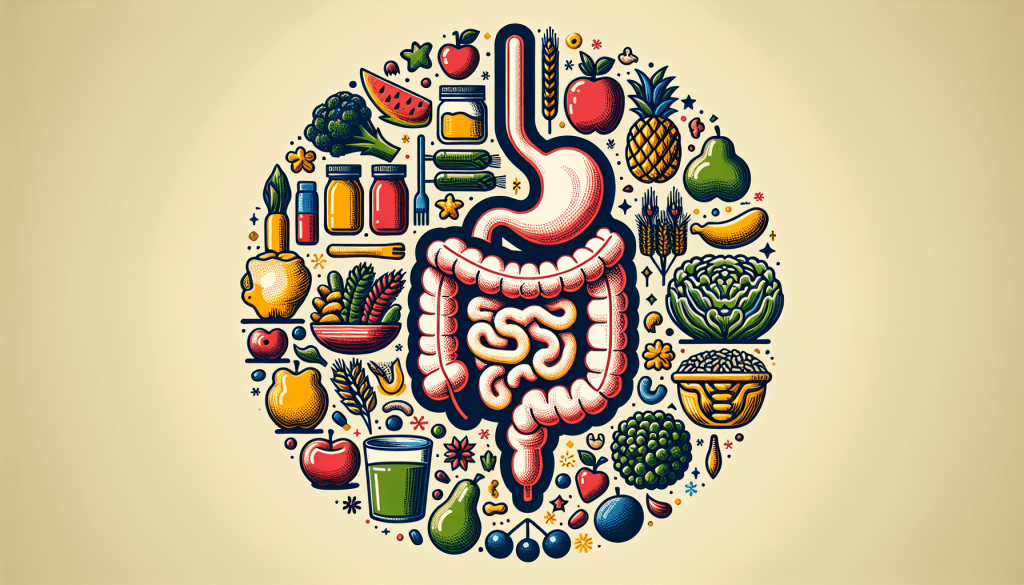Did you know that the key to maintaining a healthy gut lies in the food choices you make? Your gut health has a huge impact on your overall well-being, from your immune system to your mental health. In this article, we will explore how incorporating a healthy diet can support and improve your gut health. By making simple changes to your eating habits, you can nourish your gut with the essential nutrients it needs, promote a diverse and thriving microbiome, and prevent common digestive issues. Get ready to discover the transformative power of a healthy diet for your gut!
The Importance of Gut Health
Having a healthy gut is essential for overall well-being. Your gut, specifically the gut microbiome, plays a crucial role in digestion, nutrient absorption, immune function, and even mental health. It is home to trillions of microbes that perform various functions to maintain balance and promote good health. Understanding the gut microbiome and the factors that affect gut health is key to making informed decisions about your diet and lifestyle.
Understanding the Gut Microbiome
The gut microbiome refers to the diverse community of microorganisms, including bacteria, viruses, fungi, and other microbes, living in your gastrointestinal tract. These microbes play a vital role in breaking down complex carbohydrates, producing vitamins, regulating immune responses, and protecting against harmful pathogens.
Factors Affecting Gut Health
Several factors can influence the health of your gut microbiome. These include genetics, diet, stress levels, medications, and environmental factors. While some of these factors are beyond your control, you can make choices that positively impact your gut health and nurture a thriving microbiome.
The Role of Diet in Promoting Gut Health
One of the most significant factors affecting gut health is your diet. By incorporating specific foods into your daily routine, you can provide your gut with the nutrients and support it needs to function optimally.
Consuming a Variety of Fiber-Rich Foods
Fiber is a type of carbohydrate found in plant-based foods that cannot be broken down by the human digestive system. Instead, it acts as fuel for the beneficial bacteria in your gut. Consuming a variety of fiber-rich foods, such as whole grains, vegetables, fruits, legumes, and nuts, can help promote a diverse and healthy gut microbiome.
Incorporating Fermented Foods into Your Diet
Fermented foods are rich in beneficial bacteria known as probiotics, which can help restore and maintain a healthy balance in your gut. Examples of fermented foods include yogurt, sauerkraut, kimchi, kefir, and kombucha. Incorporating these foods into your diet can introduce beneficial bacteria and support gut health.
Choosing Prebiotic-Rich Foods
Prebiotics are non-digestible fibers that serve as food for the beneficial bacteria in your gut. Foods rich in prebiotics include garlic, onions, leeks, asparagus, bananas, and whole grains. By incorporating these prebiotic-rich foods into your diet, you can provide the necessary nutrients for the growth and nourishment of beneficial gut bacteria.
Including Probiotic Foods in Your Daily Routine
Probiotic foods contain live bacteria that can directly introduce beneficial microorganisms into your gut. Yogurt, kefir, miso, tempeh, and certain types of cheese are excellent sources of probiotics. Including these foods in your daily routine can help maintain a healthy balance of gut bacteria and support digestion.
The Benefits of Omega-3 Fatty Acids
Omega-3 fatty acids, which are found in fatty fish, flaxseeds, chia seeds, and walnuts, have been shown to have anti-inflammatory properties. By reducing inflammation in the gut, omega-3 fatty acids can promote a healthy gut environment.

Foods to Support Gut Health
In addition to the specific dietary choices mentioned above, there are certain types of foods that can contribute to overall gut health when incorporated into a well-balanced diet.
Whole Grains and Legumes
Whole grains, such as oats, brown rice, and quinoa, are excellent sources of fiber and other essential nutrients. Legumes, including beans, lentils, and chickpeas, are also rich in fiber and provide prebiotic benefits to support a healthy gut.
Colorful Fruits and Vegetables
Fruits and vegetables are packed with fiber, antioxidants, and a variety of nutrients that can support gut health. Aim to consume a diverse range of colorful produce, including leafy greens, berries, citrus fruits, and cruciferous vegetables like broccoli and cauliflower.
Healthy Fats and Oils
Incorporating healthy fats and oils into your diet, such as avocados, olive oil, and nuts, can support gut health. These foods provide essential fatty acids and contribute to a healthy inflammatory response in the gut.
Lean Proteins
Including lean protein sources in your diet, such as poultry, fish, tofu, and legumes, can provide essential amino acids needed for the growth and repair of tissues in the gut.
Nuts and Seeds
Nuts and seeds, such as almonds, walnuts, chia seeds, and flaxseeds, are rich in fiber, healthy fats, and antioxidants. Incorporating these into your diet can provide added nourishment for your gut.
Avoiding Foods that Disrupt Gut Health
While it is important to focus on consuming foods that promote gut health, it is equally essential to be mindful of foods that can disrupt the delicate balance of your gut microbiome.
Refined Sugars and Artificial Sweeteners
Excessive consumption of refined sugars and artificial sweeteners can negatively impact your gut health. These substances can promote the growth of harmful bacteria and yeast, leading to imbalances in the gut microbiome. Limiting intake of sugary foods and beverages, as well as opting for natural sweeteners in moderation, can help maintain gut health.
Processed and Fried Foods
Processed and fried foods are often high in unhealthy fats, added sugars, and artificial additives. These foods can contribute to inflammation and damage to the gut lining. Choosing whole, unprocessed foods and opting for healthier cooking methods, such as baking, grilling, or steaming, can support gut health.
Excessive Alcohol Consumption
Moderate alcohol consumption may not significantly impact gut health, but excessive alcohol intake can harm the gut microbiome and increase the risk of digestive disorders. Limiting alcohol consumption and opting for healthier alternatives can help protect your gut.
Artificial Additives and Preservatives
Many processed foods contain artificial additives, preservatives, and emulsifiers that can disrupt the gut microbiome. These substances may alter gut permeability and affect the balance of beneficial bacteria. Opting for whole, minimally processed foods can help reduce exposure to these potentially harmful substances.
The Impact of Hydration on Gut Health
Good hydration is crucial for maintaining a healthy gut. Water and herbal teas can play a significant role in supporting digestive function and promoting overall gut health.
Drinking Adequate Amounts of Water
Staying adequately hydrated ensures that your digestive system can function optimally. Water helps in the digestion and absorption of nutrients, promotes regular bowel movements, and aids in the elimination of waste products. Aim to drink at least eight cups (64 ounces) of water daily to maintain hydration and support your gut health.
Benefits of Herbal Teas
In addition to water, herbal teas can offer additional benefits for gut health. Certain herbal teas, such as chamomile, ginger, peppermint, and fennel, have been used for centuries to support digestion, soothe the gut, and reduce inflammation.
Avoiding Excessive Caffeine and Alcohol
While herbal teas can be beneficial, it’s essential to moderate your caffeine and alcohol consumption. Excessive caffeine intake can contribute to dehydration and may irritate the gut lining, while excessive alcohol consumption can disrupt the gut microbiome. Be mindful of your intake and opt for healthier alternatives or limit the consumption of caffeinated and alcoholic beverages.
The Significance of Probiotics and Prebiotics
Probiotics and prebiotics are essential for a healthy gut. They work together to support the growth of beneficial gut bacteria and maintain a harmonious balance within the gut microbiome.
Probiotics: Live Bacteria to Support Gut Health
Probiotics are live bacteria that can provide numerous health benefits when consumed. These beneficial bacteria can help restore and maintain a healthy balance in the gut microbiome, support digestion, boost the immune system, and reduce inflammation. You can find probiotics in certain fermented foods, as well as in supplement form.
Prebiotics: Fueling the Growth of Beneficial Gut Bacteria
Prebiotics are non-digestible fibers that serve as food for the beneficial bacteria in your gut. By consuming prebiotic-rich foods, you provide nourishment for these bacteria, helping them grow and thrive. Prebiotic foods include garlic, onions, leeks, bananas, asparagus, and whole grains. Incorporating these foods into your diet can support the growth of beneficial gut bacteria and improve gut health.

Managing Stress for a Healthy Gut
There is a significant connection between your gut and your brain. Stress can have a substantial impact on your gut health, so managing stress is crucial for overall well-being.
Understanding the Gut-Brain Connection
The gut and the brain communicate through a network known as the gut-brain axis. This bidirectional relationship means that stress and other emotional factors can affect gut health, while gastrointestinal health can also influence mental well-being. High levels of stress can lead to digestive issues, inflammation, and imbalances in the gut microbiome.
Practicing Stress-Reducing Techniques
To support gut health, it is important to manage stress effectively. Engaging in stress-reducing techniques such as regular exercise, meditation, deep breathing exercises, yoga, and spending time in nature can help mitigate the impact of stress on the gut. Finding activities that you enjoy and incorporating them into your daily routine can have a profound positive effect on both your mental well-being and gut health.
Exercise and Gut Health
Regular physical activity is beneficial for overall health, including gut health. Exercise can directly and indirectly impact the gut microbiota and promote a healthy environment within the gastrointestinal tract.
Promoting Regular Physical Activity
Engaging in regular physical activity, such as aerobic exercises, resistance training, or even walking, can support a healthy gut by increasing blood flow to the intestines and promoting efficient digestion. Aim for at least 150 minutes of moderate-intensity exercise or 75 minutes of vigorous-intensity exercise per week to reap the benefits for your gut health.
Effect of Exercise on Gut Microbiota
Research suggests that regular exercise can positively influence the composition and diversity of the gut microbiota. Exercise may increase the abundance of beneficial bacteria associated with improved gut health. Additionally, physical activity has been shown to decrease inflammation and enhance intestinal barrier function, further supporting a healthy gut.

Sleep and Gut Health
Quality sleep is crucial for overall well-being, including gut health. Inadequate sleep can disrupt the gut microbiome and lead to various gastrointestinal issues.
The Importance of Quality Sleep
During sleep, your body undergoes essential restorative processes, including the repair and renewal of cells throughout the body, including the gut lining. Quality sleep allows for proper digestion, absorption of nutrients, and maintenance of a healthy gut microbiome. Aim for 7-9 hours of uninterrupted sleep each night to support optimal gut health.
Sleep’s Impact on Gut Function
Disrupted or inadequate sleep has been linked to imbalances in gut bacteria, increased intestinal permeability, and changes in hormone regulation. These factors can contribute to digestive issues, inflammation, and a compromised gut barrier. Prioritizing quality sleep and adopting healthy sleep habits can help foster a healthy gut environment.
Seeking Professional Advice for Gut Health
If you are experiencing persistent gut health issues or are unsure about the best ways to support your gut health, seeking professional advice can be beneficial. Registered dietitians and medical professionals can provide personalized recommendations and guidance based on your specific needs.
Consultation with a Registered Dietitian
Registered dietitians specialize in nutrition and can offer expert guidance on optimizing your diet for gut health. They can help identify appropriate dietary changes, develop meal plans, and provide evidence-based recommendations tailored to your individual needs.
Medical Evaluation of Gut Health Issues
If you are experiencing persistent gut health issues, such as chronic digestive disorders or severe symptoms, seeking medical evaluation is essential. A healthcare professional can conduct necessary tests and assessments to diagnose underlying conditions and develop an appropriate treatment plan.
In conclusion, nurturing a healthy gut is vital for overall well-being. By understanding the gut microbiome, making conscious dietary choices, managing stress, exercising regularly, prioritizing quality sleep, and seeking professional advice when needed, you can support and promote your gut health. Remember, small changes in your diet and lifestyle can make a significant difference in maintaining a thriving gut microbiome and enjoying the benefits of optimal gut health.










